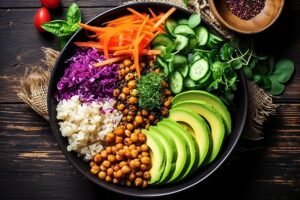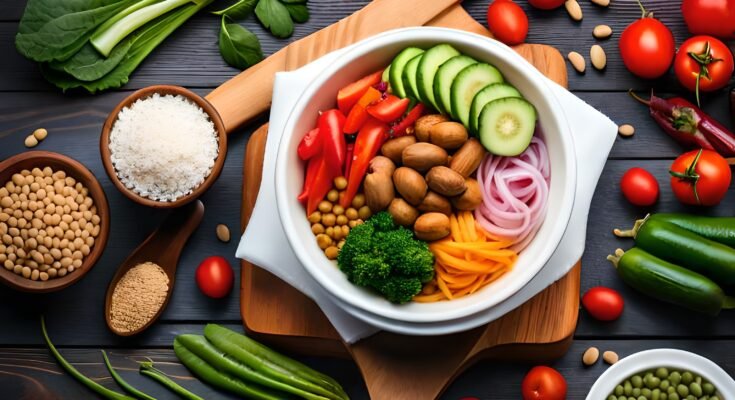Introduction
Are you someone who loves exploring new dietary trends or looking to adopt a healthier, eco-friendly lifestyle? Then, a plant-based diet might just be what you need. This blog post will take you on a culinary and informational journey through the world of vegan and vegetarian diets. We’ll explore the benefits, share mouth-watering recipes, and discuss current trends in plant-based eating. Whether you’re a health enthusiast, an eco-conscious consumer, or a food blogger, there’s something here for everyone. Let’s get started!
What is a Plant-Based Diet?
A plant-based diet focuses on foods derived from plants. This includes not only fruits and vegetables but also nuts, seeds, oils, whole grains, legumes, and beans. Unlike a vegan diet, which excludes all animal products, a plant-based diet can be more flexible. Some people include small amounts of animal products but the main focus remains on plant foods.
The goal of a plant-based diet is to consume nutrient-dense foods that provide essential nutrients while minimizing processed foods and artificial ingredients. This way of eating can offer numerous health benefits while being kind to the planet.

The Health Benefits of Plant-Based Eating
Boosts Heart Health
One of the most significant benefits of a plant-based diet is its potential to improve heart health. Plant foods are high in fiber, antioxidants, and healthy fats, which can help lower cholesterol levels and reduce the risk of heart disease. Studies have shown that people who follow a vegetarian or vegan diet have a lower risk of developing cardiovascular conditions.
Aids in Weight Management
If you’re looking to shed some pounds, a plant-based diet might be the answer. Plant foods are often lower in calories and higher in fiber, which helps you feel fuller for longer. This can lead to reduced calorie intake and, ultimately, weight loss. Additionally, plant-based diets are rich in vitamins and minerals that support metabolism and overall health.
Reduces the Risk of Chronic Diseases
A plant-based diet can also lower the risk of chronic diseases such as diabetes, hypertension, and certain types of cancer. The high levels of antioxidants and anti-inflammatory compounds found in plant foods can help protect against cell damage and reduce inflammation in the body. Incorporating more fruits, vegetables, and whole grains into your diet can significantly impact your long-term health.
Exploring Vegan Recipes
Breakfast Ideas
Kickstart your day with a nutritious and delicious vegan breakfast. Try a hearty bowl of overnight oats topped with fresh berries, chia seeds, and a drizzle of almond butter. Another great option is a smoothie bowl loaded with spinach, banana, mango, and a sprinkle of granola for added crunch.
Lunch Options
For lunch, consider preparing a satisfying quinoa salad with roasted vegetables, chickpeas, and a tangy lemon-tahini dressing. Or, whip up a batch of creamy tomato and lentil soup, perfect for those cooler days. Both options are packed with protein and fiber to keep you energized throughout the day.
Dinner Delights
End your day with a comforting vegan dinner. A classic favorite is a vegetable stir-fry with tofu, bell peppers, broccoli, and snap peas, served over brown rice or noodles. Another delicious option is a lentil and sweet potato shepherd’s pie, topped with creamy mashed potatoes and baked to perfection.
Vegetarian Recipes to Try
Appetizing Starters
Start your meal with a flavorful vegetarian appetizer. Try stuffed mushrooms filled with a mixture of spinach, garlic, and ricotta cheese. Another tasty option is a Caprese salad with ripe tomatoes, fresh basil, mozzarella, and a drizzle of balsamic glaze.
Main Course Magic
For the main course, consider a vegetarian lasagna layered with roasted vegetables, marinara sauce, and a rich béchamel sauce. Alternatively, prepare a hearty chickpea and spinach curry, served with warm naan bread and a side of basmati rice. Both dishes are sure to impress your family and friends.
Decadent Desserts
Don’t forget about dessert! A classic favorite is a rich and creamy chocolate avocado mousse, sweetened with a touch of maple syrup and topped with fresh berries. Another delightful option is a spiced carrot cake with cream cheese frosting, perfect for any occasion.
Popular Plant-Based Diet Trends
Flexitarian Diet
The flexitarian diet is a flexible approach to plant-based eating that allows for occasional meat and animal products. This trend is gaining popularity as it offers the benefits of a plant-based diet without the strict limitations of veganism or vegetarianism. It’s an excellent option for those who want to reduce their meat consumption and adopt a healthier lifestyle.
Meat Alternatives
With the growing demand for plant-based options, meat alternatives are becoming increasingly popular. Products like Beyond Meat and Impossible Foods offer plant-based burgers, sausages, and ground meat that mimic the taste and texture of real meat. These alternatives provide a convenient way to enjoy familiar flavors while following a plant-based diet.
Sustainable Eating
Sustainability is a key focus for many people adopting a plant-based diet. Choosing locally sourced, organic, and seasonal produce helps reduce the environmental impact of food production. Supporting sustainable farming practices and reducing food waste are also essential components of this trend.
Tips for Transitioning to a Plant-Based Diet
Start Slow
Transitioning to a plant-based diet doesn’t have to happen overnight. Start by incorporating more plant-based meals into your weekly routine. Gradually replace animal products with plant-based alternatives, and experiment with new recipes to find what you enjoy.
Educate Yourself
Take the time to educate yourself about plant-based nutrition. Learn about essential nutrients like protein, iron, calcium, and vitamin B12, and how to obtain them from plant sources. There are plenty of resources available, including books, documentaries, and online courses.
Seek Support
Join online communities or local groups of like-minded individuals who can offer support and advice. Sharing your experiences and learning from others can make the transition to a plant-based diet more enjoyable and sustainable.
Common Misconceptions About Plant-Based Diets
Lack of Protein
One of the most common misconceptions about plant-based diets is that they lack sufficient protein. However, many plant foods are rich in protein, including beans, lentils, tofu, tempeh, quinoa, and nuts. By including a variety of these foods in your diet, you can easily meet your protein needs.
Limited Food Choices
Another misconception is that plant-based diets are restrictive and lack variety. On the contrary, there is a wide range of delicious and diverse plant-based foods to explore. From international cuisines to creative recipes, the possibilities are endless.
Expensive and Time-Consuming
Some people believe that following a plant-based diet is expensive and time-consuming. While certain specialty products can be pricey, many plant-based foods like beans, grains, and vegetables are affordable and readily available. With proper planning and meal prepping, you can enjoy a plant-based diet without breaking the bank.
The Environmental Impact of Plant-Based Eating
Reducing Greenhouse Gas Emissions
One of the significant environmental benefits of a plant-based diet is its potential to reduce greenhouse gas emissions. Animal agriculture is a major contributor to methane and carbon dioxide emissions. By choosing plant-based options, you can help lower your carbon footprint and contribute to a healthier planet.
Conserving Water Resources
Plant-based diets also play a role in conserving water resources. Producing plant foods generally requires less water compared to raising livestock. By reducing your consumption of animal products, you can help alleviate water scarcity and promote sustainable water use.
Preserving Biodiversity
Adopting a plant-based diet can also help preserve biodiversity. Industrial farming practices often lead to deforestation, habitat destruction, and loss of wildlife. By supporting sustainable and plant-based agriculture, you can contribute to the protection of ecosystems and biodiversity.
The Future of Plant-Based Diets
Technological Advancements
The future of plant-based diets looks promising, with advancements in food technology driving innovation. Companies are developing new and improved plant-based products that closely mimic the taste, texture, and appearance of animal products. These innovations make it easier for people to transition to a plant-based diet without sacrificing their favorite foods.
Increasing Awareness
As awareness of the health, environmental, and ethical benefits of plant-based diets continues to grow, more people are making the switch. Educational campaigns, documentaries, and social media influencers are playing a significant role in spreading the message and inspiring others to adopt plant-based lifestyles.
Expanding Market
The plant-based food market is expanding rapidly, with more options available in grocery stores, restaurants, and food delivery services. This increased accessibility makes it easier than ever for people to incorporate plant-based foods into their daily lives.
Conclusion
In conclusion, adopting a plant-based diet offers numerous benefits for your health, the environment, and overall well-being. Whether you’re exploring vegan and vegetarian recipes, looking to improve your diet, or simply wanting to try something new, there’s a wealth of options to discover. By making mindful choices and incorporating more plant-based foods into your meals, you can enjoy a delicious, nutritious, and sustainable lifestyle. Ready to take the next step? Explore our recipes, join our community, and start your plant-based journey today!




